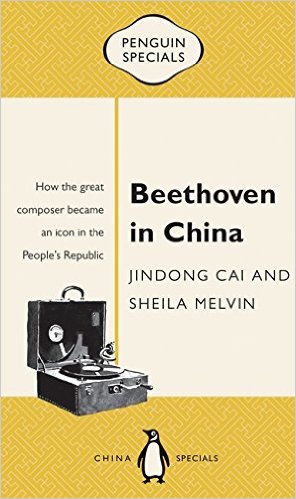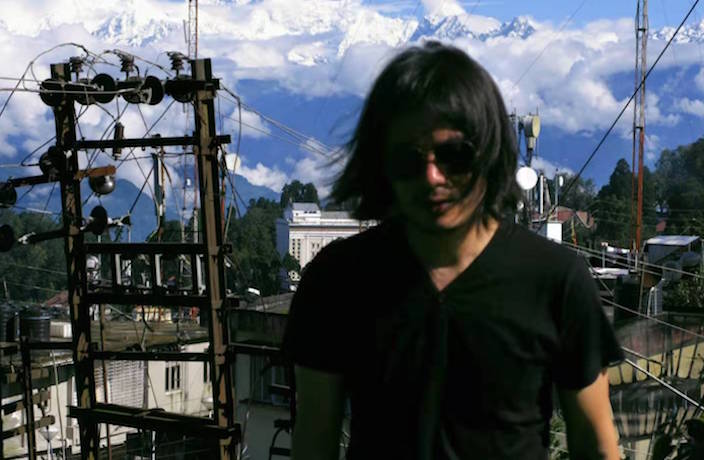Best known as the conductor and music director of the Stanford Symphony Orchestra, Cai Jindong’s musical journey has taken him from his home in Beijing to America, where early teachers included Leonard Bernstein. In his follow-up to Rhapsody in Red: How Western Classical Music Became Chinese, he explores China’s long love affair with the music of Beethoven. Recently released as a Penguin China Special, Beethoven in China is a fascinating look at the influence of the composer with Cai dishing personal stories like hearing his music for the first time on a contraband set of 78RPM records during the Cultural Revolution.
Congratulations on your new Penguin China Specials book Beethoven in China. How did you first hear Beethoven and what was it about the music that resonated?
My first encounter with Beethoven during the Cultural Revolution was like an adventure. I did not know Beethoven much before that and only know the name as a Western music composer. So when I heard his music the first time, I was fascinated by the beauty of the melodies from different sections and the harmony going with it. I was wondering how there could be so many melodic lines at the same time. I do not remember which symphony I heard but either symphony no. 5 or no. 4, maybe both.
Beethoven in China recounts how students returning from abroad introduced Beethoven to China at the turn of the 20th century. Why was it him particularly that resonated in China, compared to other great composers?
When a handful of Western composers were introduced to China in the early 20th century, there was nowhere their music could really be heard by Chinese. I believe Beethoven stood out because his life story resonated with Chinese people and inspired them – and it was so perfectly suited to the era. Beethoven overcame so many hardships in his life – he “ate bitter,” as we Chinese would say, and then triumphed. This appealed to intellectuals who wanted to make themselves, and China, strong. China was searching for new role models and Beethoven was perfect.
 The book touches on Beethoven’s influence on the May Fourth Movement and the normalization of US-China relations. Without giving away the book, could you give us a quick explanation on how?
The book touches on Beethoven’s influence on the May Fourth Movement and the normalization of US-China relations. Without giving away the book, could you give us a quick explanation on how?
May Fourth was an era of political upheaval, experimentation and questioning. Many intellectuals wanted to throw off the shackles of Chinese tradition – which they thought made China weak – and import the culture of the West, which they saw as strong. Many young people went overseas to study, where they learned about Beethoven and classical music. Lu Xun, Xu Zhimo, Cai Yuanpei and Xiao Youmei – all these influential intellectuals suggested that China should import Beethoven for moral inspiration and to help make China strong. The great translator Fu Lei translated Romain Rolland’s Life of Beethoven – which Chinese middle school students still read today – and more and more people began to know about, and be inspired by, the German composer. Gradually he became a part of China’s socio-political culture.
The second part of your question, about Beethoven’s “role” in the normalization of US-China relations is a wonderful story. It started with Premier Zhou Enlai suggesting that the Central Philharmonic play Beethoven for US Secretary of State Kissinger on one of his early visits – Zhou thought Kissinger, who was originally German, would be happy to hear German music. But Jiang Qing and the Gang of Four didn’t like this so they got involved and began analyzing all Beethoven’s symphonies through Cultural Revolution politics – the Fifth was bad because it was about “fate” and the third was bad because it was “about” Napoleon. Finally it was decided the Sixth – the Pastorale – was acceptable because it was about “peasants”! When the Philadelphia Orchestra came in 1973 and wanted to play the Fifth, Jiang Qing interfered again, insisting they play the Sixth instead. So when the Cultural Revolution ended and Jiang Qing was arrested, the Central Philharmonic celebrated by playing Beethoven’s Fifth in a live nationwide radiobroadcast – for many music lovers, this marked the real end of the Cultural Revolution.
Growing up, were you exposed to much classical Western music?
I grew up during the Cultural Revolution. Even though there were few years you could not play Western music, you could still study Western instruments – the Cultural Revolution model operas all used Western instruments. So I started learning to play the violin and the piano during the Cultural Revolution. In public you only performed revolutionary music, but in private we played etudes and music by composers like Beethoven, Mozart and Chopin.
How would you say China’s classical traditions differ from those from abroad?
Chinese traditional music is of course rather different from Western classical music – it is pentatonic and melodic based. The instruments are completely different, as well.
You are currently conductor and music director of the Stanford Symphony Orchestra. While you received your early musical training in China, you moved to America in 1985 to continue your training. Was that a difficult transition and did you face any early challenges as a native from China?
When I came to America 30 years ago, the most challenging “transition” probably was how to enter into American society and American culture. Music is in part a reflection of culture and society – when you learn classical music, there is much more to study than the music itself. To really understand classical music, you have to know its roots and philosophy, the history of the era in which it was created etc. Of course, before I could this I had to learn English first! So, yes, it was hard, but it was worth it. I value the process of learning – like that of music-making – as much as the end result.
China is producing a number of classical stars like Li Yundi. Do you think it’s possible for these musicians to remain in China and are there any local artists whose music you enjoy?
I think it is increasingly possible, but I think the ideal is to have a global education. This can give you a richer cultural experience and understanding of the music. But that doesn’t mean that you can’t live in China your whole life and be an excellent classical musician or have music be a vital part of your life – I think the stories we tell in Beethoven in China attest to this.
You also previously co-wrote Rhapsody in Red. Are there any written projects that you are working on that you can discuss?
I am contributing to a history of Steinway pianos in China – Steinway is such an amazing company and its pianos have played a vital role in China’s musical development. But most of my focus is on musical projects. I am using my experience to contribute to classical music development in China – that’s why I come back to conduct as much as I can. On the other hand, I am working to promote the music of Chinese composers to the American public by performing their works in professional and educational settings, especially with American orchestras. At Stanford, I am working with the Center of East Asian Studies to create an oratorio that reflects the experience of the Chinese railroad workers in America 150 years ago; this project also involves the Shanghai Conservatory.
> Nov 7, 3pm, RMB75. M on the Bund, tickets.
> Beethoven in China is available on Amazon.
> Check out our full preview of the Shanghai International Literary Festival and our festival related features.






















0 User Comments